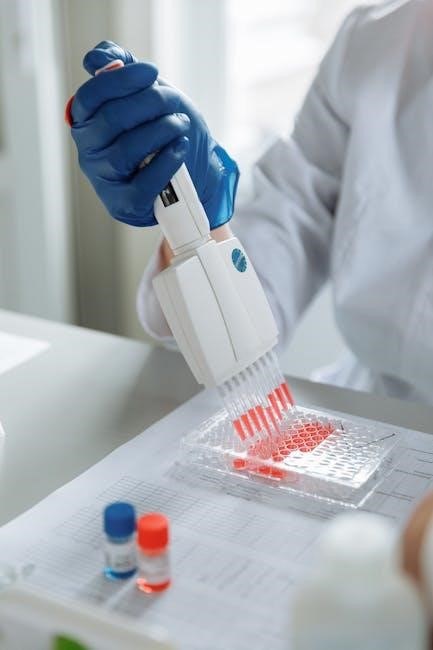Pharmacology Test Bank PDF: A Comprehensive Guide
This comprehensive guide dives into pharmacology test banks in PDF format, essential resources for nursing, pharmacy, and medical students. It explores their role in mastering pharmacology, preparing for exams like NCLEX, and building critical thinking. Key features, benefits, and ethical considerations are discussed.
Pharmacology test banks are curated collections of exam-style questions designed to assess and reinforce understanding of pharmacological principles. Typically found in PDF format for easy access and portability, these resources are indispensable tools for students in nursing, pharmacy, and medicine. They serve as a vital supplement to textbooks and lectures, providing a practical application of theoretical knowledge.
These test banks encompass a broad spectrum of topics, mirroring the comprehensive nature of pharmacology curricula. From pharmacokinetics and pharmacodynamics to drug classifications and therapeutic uses, test banks cover the essential concepts students need to master. The questions are often formatted in various styles, including multiple-choice, select-all-that-apply, and scenario-based questions, mimicking the types of assessments encountered in coursework and licensure exams like the NCLEX.
A well-constructed pharmacology test bank goes beyond simple recall, challenging students to apply their knowledge in clinically relevant situations. By working through these questions, students can identify their strengths and weaknesses, refine their understanding of complex topics, and develop the critical thinking skills necessary for safe and effective medication management in healthcare settings. This introduction sets the stage for understanding the broader importance and effective utilization of pharmacology test banks.
Importance of Test Banks in Pharmacology Education
Pharmacology test banks play a pivotal role in shaping well-rounded healthcare professionals by solidifying their understanding of medications. They act as a bridge connecting theoretical knowledge gained from textbooks and lectures to real-world clinical scenarios, enhancing critical thinking and decision-making skills. The ability to apply pharmacological principles is crucial for safe and effective patient care.
Test banks provide a structured method for self-assessment, enabling students to identify areas where their understanding may be lacking. This targeted approach allows for focused study and remediation, maximizing learning efficiency. By working through a variety of question formats, students develop familiarity with different assessment styles, boosting their confidence and performance during examinations.
Moreover, pharmacology test banks foster the development of clinical reasoning skills essential for healthcare practice. Many questions are designed to simulate real-life patient cases, requiring students to analyze information, evaluate treatment options, and predict potential outcomes. This hands-on experience prepares students to make informed decisions about medication management, contributing to improved patient safety and optimal therapeutic outcomes. The use of test banks is therefore integral to a comprehensive pharmacology education.
Key Topics Covered in Pharmacology Test Banks
Pharmacology test banks comprehensively address a multitude of essential topics, providing students with a broad understanding of drug actions and interactions. These resources commonly cover pharmacokinetics, exploring drug absorption, distribution, metabolism, and excretion processes. Understanding these principles is crucial for predicting how the body will respond to a particular medication.

Pharmacodynamics, the study of drug effects on the body, is another core area. Test bank questions delve into mechanisms of action, receptor interactions, and dose-response relationships, enhancing students’ comprehension of drug efficacy and potential adverse effects. Autonomic nervous system drugs, cardiovascular medications, and central nervous system agents are frequently included, reflecting the importance of these drug classes in clinical practice.
Furthermore, test banks often address specific therapeutic areas such as endocrine pharmacology, antimicrobial therapy, and pain management. Questions may focus on drug selection, monitoring parameters, and patient education, enabling students to apply pharmacological knowledge to diverse clinical scenarios. By covering such a wide range of topics, pharmacology test banks equip students with the necessary knowledge base for success in their academic and professional endeavors, ensuring they are well-prepared to deliver safe and effective medication therapy.
NCLEX-Style Questions in Pharmacology Test Banks
Pharmacology test banks are invaluable resources for nursing students preparing for the NCLEX examination, largely due to their inclusion of NCLEX-style questions. These questions are designed to mimic the format, difficulty, and content areas emphasized on the actual NCLEX, providing students with realistic practice and assessment opportunities. A key feature of NCLEX-style questions is their focus on application and critical thinking rather than simple recall of facts.
Many questions present clinical scenarios that require students to analyze patient information, prioritize nursing actions, and make informed decisions regarding medication administration. Questions often involve multiple-choice formats with four plausible answer options, requiring careful evaluation and discrimination. Furthermore, NCLEX-style questions frequently incorporate various alternate item formats, such as select-all-that-apply, fill-in-the-blank, ordered response, and chart/exhibit questions, to assess different aspects of nursing competence.
By consistently engaging with NCLEX-style questions in pharmacology test banks, students can develop their clinical reasoning skills, improve their test-taking strategies, and increase their confidence in their ability to successfully answer pharmacology-related questions on the NCLEX. The test banks serve as essential tools in preparing future nurses for the challenges of medication management in real-world clinical settings.
Benefits of Using Pharmacology Test Banks for Students
Pharmacology test banks offer numerous advantages to students navigating the complexities of drug mechanisms and therapeutic applications. One primary benefit is the ability to assess knowledge comprehension effectively. Test banks provide a diverse range of questions covering various topics, allowing students to identify their strengths and weaknesses.
This self-assessment promotes targeted studying, enabling learners to concentrate on areas needing improvement. Another significant advantage is improved exam preparation. Pharmacology test banks often contain questions similar to those encountered on actual exams, familiarizing students with the format, style, and difficulty level. This exposure reduces anxiety and enhances confidence, leading to better performance during assessments.
Moreover, test banks facilitate the development of critical thinking skills. Many questions present clinical scenarios that require students to apply their knowledge to real-world situations. By analyzing and evaluating different options, students refine their ability to make informed decisions regarding medication management.
Test banks also aid in knowledge retention. Regularly reviewing and answering questions reinforces learning, helping students retain information more effectively. This is especially crucial in pharmacology, where understanding complex concepts is essential for safe and effective practice. In essence, pharmacology test banks serve as invaluable tools for students seeking to master the subject, excel in their courses, and ultimately become competent healthcare professionals.
How to Effectively Use a Pharmacology Test Bank
To maximize the benefits of a pharmacology test bank, students should adopt a strategic approach. First, it is crucial to understand the scope of the material covered in the test bank and align it with the course syllabus. Before diving into the questions, review relevant textbook chapters, lecture notes, and other study resources to establish a solid foundation of knowledge.
Next, approach the test bank systematically. Start by attempting questions related to topics already covered in class. As you answer each question, pay close attention to the rationale provided, regardless of whether you answered correctly or not. These explanations offer valuable insights into the underlying concepts and help reinforce learning.
Focus on understanding why certain answers are correct and others are incorrect. If you struggle with a particular topic, revisit the relevant material and try similar questions until you grasp the concept. It is also beneficial to simulate exam conditions by setting time limits and minimizing distractions.

Analyze your performance regularly to identify areas where you need further improvement. Keep track of the topics you consistently struggle with and dedicate extra time to mastering them. Consider using the test bank in conjunction with other study methods, such as flashcards or group discussions, to enhance your learning experience. By following these strategies, students can effectively utilize pharmacology test banks to improve their understanding, boost their confidence, and achieve success in their pharmacology courses.
Where to Find Reliable Pharmacology Test Banks
Securing a trustworthy pharmacology test bank is crucial for effective study and exam preparation. A primary source is the textbook itself; many publishers offer supplementary test banks either bundled with the book or available for separate purchase. These are often the most reliable as they directly correlate with the textbook’s content.
University bookstores and academic websites are also good places to check. Professors might recommend specific test banks or provide access to them through course websites or learning management systems. Additionally, educational resource platforms like Quizlet and Course Hero can offer user-generated test banks and practice questions; However, the reliability of these sources can vary, so it’s important to critically evaluate the content.
Nursing and pharmacy organizations sometimes provide resources or links to reputable test banks. When searching online, be cautious of websites offering free test banks, as they might contain inaccurate information or be outdated. Always cross-reference information with your textbook and lecture materials. Look for test banks that provide detailed rationales for answers, as this indicates a higher level of quality and accuracy.
Consider consulting with classmates or instructors for recommendations on reliable test banks. By carefully vetting your sources, you can ensure that you are using a high-quality resource that will effectively aid your pharmacology studies.
Free vs. Paid Pharmacology Test Banks
When seeking pharmacology test banks, a common question arises: should you opt for free resources or invest in paid ones? Both options have their advantages and disadvantages. Free test banks are readily accessible, often found on websites like Quizlet or through shared student resources. They can be a convenient way to initially gauge your understanding and practice basic concepts without any financial commitment.
However, the quality and reliability of free test banks can be inconsistent. Questions might be outdated, contain errors, or lack detailed rationales, potentially leading to misunderstandings. Paid test banks, on the other hand, typically offer higher-quality content. These are often created by textbook publishers, professional organizations, or reputable educational companies.
Paid test banks usually feature meticulously reviewed questions, comprehensive rationales explaining the correct answers, and updated content aligned with the latest editions of textbooks. They may also provide a wider variety of question formats, including NCLEX-style questions, and features like performance tracking. While paid test banks require an investment, they can offer a more structured and reliable study experience.
Ultimately, the choice depends on your individual needs and budget. If you’re on a tight budget, free resources can supplement your studies, but it’s crucial to verify the accuracy of the information. If you prioritize quality, comprehensive coverage, and detailed explanations, a paid test bank might be a worthwhile investment to enhance your learning and exam preparation.
Formats of Pharmacology Test Banks (PDF, Online)
Pharmacology test banks are available in various formats, primarily PDF and online platforms, each offering distinct advantages. PDF test banks provide a static, downloadable document containing a collection of questions and answers. Their main benefit is portability; you can access them offline on any device, making them suitable for studying in areas with limited internet connectivity.
PDFs also allow for easy printing, enabling you to create physical copies for review. However, PDFs lack interactivity and may not offer features like performance tracking or immediate feedback. Online test banks, in contrast, are hosted on websites or learning management systems, offering a dynamic and interactive study experience.
These platforms often include features like instant answer checking, detailed rationales, performance analytics, and customizable quizzes. Online test banks can also adapt to your learning needs, providing targeted practice based on your strengths and weaknesses. Some platforms even offer mobile apps, allowing for convenient access on smartphones and tablets.

The downside of online test banks is their dependence on internet access. However, the interactive features and personalized learning experience they offer can be highly beneficial for exam preparation. Ultimately, the choice between PDF and online formats depends on your learning preferences, study habits, and access to reliable internet connectivity.
Features to Look for in a Quality Pharmacology Test Bank
When selecting a pharmacology test bank, several key features distinguish high-quality resources from less effective ones. Look for a test bank with a comprehensive range of questions covering all major pharmacology topics, including pharmacokinetics, pharmacodynamics, drug classifications, and therapeutic uses. The questions should reflect the content and difficulty level of your course material and target exams.
A good test bank provides detailed rationales for both correct and incorrect answers. These rationales explain the underlying pharmacological principles and help you understand why a particular answer is right or wrong. This feature is crucial for reinforcing learning and improving critical thinking skills. The test bank should offer a variety of question formats, such as multiple-choice, true/false, select-all-that-apply, and scenario-based questions.
This variety prepares you for the different question types encountered on pharmacology exams. Look for NCLEX-style questions to prepare for licensure exams. A user-friendly interface is also important. The test bank should be easy to navigate, with clear organization and search functionality. The ability to create custom quizzes based on specific topics or difficulty levels is also a valuable feature.
Finally, consider the source of the test bank. Reputable publishers and experienced educators are more likely to produce accurate and reliable resources. Look for reviews or testimonials from other students to gauge the quality of the test bank.
Test Bank Question Types and Rationales
Pharmacology test banks employ diverse question types to assess your understanding comprehensively. Multiple-choice questions are prevalent, testing recall and application of knowledge. Select-all-that-apply questions challenge your ability to identify multiple correct answers, mirroring real-world clinical scenarios with multiple considerations. True/false questions assess your grasp of fundamental concepts, while fill-in-the-blank questions require precise recall of terms and facts. Scenario-based questions present realistic patient situations, demanding critical thinking and clinical judgment in medication management.
A crucial component of any effective test bank is the inclusion of detailed rationales. These explanations accompany each question, clarifying why a particular answer is correct and, equally important, why the other options are incorrect. Rationales delve into the pharmacological principles underlying each question, reinforcing your understanding of drug mechanisms, therapeutic effects, and potential adverse reactions. They connect the question to relevant concepts, promoting deeper learning and retention.
Furthermore, rationales help you identify knowledge gaps and areas needing further study. By analyzing the explanations, you can pinpoint specific concepts or drug classes where your understanding is weak. This allows you to focus your study efforts more effectively. Well-written rationales not only provide the correct answer but also teach you the reasoning process behind it, enabling you to apply that knowledge to novel situations. Ultimately, thorough rationales transform a test bank from a mere assessment tool into a valuable learning resource.

Utilizing Test Banks for Exam Preparation
Pharmacology test banks are invaluable tools for exam preparation, offering a structured approach to mastering the subject matter. Begin by taking a pre-test to identify your strengths and weaknesses. Focus your initial studies on areas where you struggled, using the test bank questions as a guide to pinpoint specific topics needing review. Incorporate test bank questions into your regular study routine, dedicating time to practice and reinforce your understanding.
Simulate exam conditions by setting time limits for each question and completing practice tests under pressure. Analyze your performance after each practice session, paying close attention to the rationales provided for both correct and incorrect answers. Use this feedback to refine your study plan and target areas where you need additional practice. Track your progress over time to monitor your improvement and identify any persistent knowledge gaps.
Don’t solely rely on memorization; focus on understanding the underlying principles and applying them to different scenarios. Use the test bank to develop your critical thinking skills by analyzing the question stems and evaluating the answer options carefully. Practice NCLEX-style questions to familiarize yourself with the format and difficulty level of the actual exam. By utilizing pharmacology test banks strategically, you can build confidence, improve your performance, and achieve success in your pharmacology exams.
Ethical Considerations When Using Test Banks
While pharmacology test banks are valuable study resources, it’s crucial to consider the ethical implications of their use. Test banks are designed to assess understanding, not to be memorized for rote regurgitation. Relying solely on memorizing answers without grasping the underlying concepts undermines the purpose of education, which is to develop critical thinking and problem-solving skills.
Using test banks to gain an unfair advantage over other students is unethical and can compromise the integrity of the academic environment. Sharing test bank content with others who have not purchased it or are not authorized to use it is a violation of copyright and academic integrity policies. Furthermore, relying on test banks to pass exams without genuinely understanding the material can have serious consequences in professional practice, especially in healthcare settings where patient safety is paramount.
It’s essential to use test banks responsibly and ethically, focusing on understanding the concepts rather than simply memorizing answers. Use test banks as a tool to identify areas where you need to improve your knowledge and skills, and supplement your studies with other resources such as textbooks, lectures, and clinical experiences. Maintain academic integrity by not sharing test bank content and by using test banks solely for self-assessment and learning purposes. Remember, the goal is to become a competent and ethical healthcare professional, not just to pass exams.
